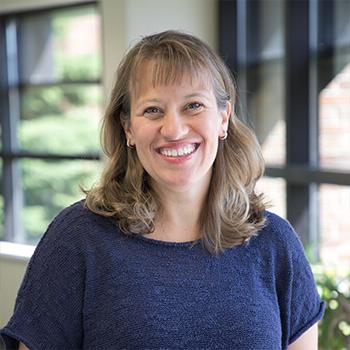The PhD curriculum encompasses three core areas of concentrated study that will build your capacity to serve as a qualified leader. The colloquium courses provide a platform for scholarly discussions and in-depth research analysis.
Doctor of Philosophy in Leadership in Innovation and Continuous Improvement (LICI)
A research-intensive PhD program that will build your expertise and confidence to be an influential leader.
Earn an online PhD in leadership
Embark on a transformative doctoral program for adult learners in any industry looking to elevate their leadership impact. Through a rigorous emphasis on research, you will acquire the expertise needed to introduce groundbreaking approaches and strategies for an organization and its workforce. Dedicate yourself to three years of intensive learning and research to emerge as an indispensable leader in your field.
Submit an application by May 22 to join our June cohort. Or be a part of the January 2025 cohort.
Accredited by the Higher Learning Commission (HLC) in May 2024.
Please note: this program is offered online through our sister campus at Concordia University Wisconsin.
Mission statement
Our interdisciplinary PhD program is inspired by a Christian worldview, stewardship, and service. The mission of this program is to prepare scholarly leaders who will bring positive and impactful change in their vocations.
Program highlights
This is a doctoral experience that allows life-long learners to hold a full-time job and successfully progress through this educational journey. It is a PhD that centers on building your expertise in three core areas:
- Leadership
- Research
- Improvement Science and Innovation
Key details
- Interdisciplinary focus that will benefit individuals serving in education, business, healthcare, non-profit, and other fields.
- The main format of our courses is the asynchronous online learning, allowing you to access lessons at your convenience over an 8-week time frame. While this flexible format gives you control over your schedule, it is important to note that assignments still have set deadlines to keep you on track towards your goals.
- Colloquium courses are built for scholarly discussions and analyzing research with faculy and your doctoral peers. Colloquiums have periodic Zoom sessions that take place at a scheduled time during a 16-week session. Here are those required courses:
- The Christian Leader Journey Colloquium
- 360 Thinking and Analysis Colloquium: Thinking Critically about Research
- Education and Learning Colloquium
- Psychology and Human Behavior Colloquium
- Dissertation process is broken down into separate and manageable components that you will work on one at a time for course credit starting in your first semester
- Establish connections in the community through presentations and other professional engagements
- Individualized journey with support from an assigned research advisor, Ph.D. faculty, and your academic advisor
- Inspires and empower students to draw strength from their faith, fueling their passion to create a meaningful influence in both the global community and within the church.
Concordia University offers another doctoral degree if the research-intensive PhD doesn't fit your needs and goals. Discover how the EdD for the LICI program is different and if it is the right fit for you.
- 60-credit requirement
- 3-year program
- Cohort model - You start with a specific group of doctoral students and progress through the program with these peers for improved learning and greater collaboration.
- A majority of the course time is online and asynchronous. There will be periodic synchronous sessions via Zoom during the colloquium courses.
- Assigned a research advisor (dissertation chair) within the first semester
- Complete a dissertation including your public defense to a committee
- Submit a manuscript to a peer-reviewed journal
- Submit scholarly material to a conference or do a face-to-face presentation in a professional group setting
- Attend a conference and/or participate in dissertation defenses for other PhD students
- Attend two required in-person residences. Each residency is 3-4 days in length.
- 1st residency takes place as you begin the doctoral program
- 2nd residency occurs sometime after you have completed your first year
- Online
Entrance requirements
- Must have a master's degree with a focus in this doctoral program or other relevant degree from a regionally accredited institution.
- Have earned a minimum GPA of 3.0 on 4.0 scale in one's master's coursework. (A lower GPA will be considered on an individual basis.)
- Provide proof of English proficiency if English is a second language.
- No GMAT or GRE is required.
Admissions process for graduate school
- Application form available at www.cuw.edu/apply
- Submit official transcripts from graduate or equivalent coursework
- Submit a resume or CV, and a list of references
- Submit an example of scholarly writing from graduate-level courses or other related work
- Submit two letters of recommendation from professional sources
- Students may be asked to schedule an interview with the LICI admissions sub-committee
- Submit a Letter of Intent (no more than two pages) providing evidence for consideration to be admitted to the LICI program. The Letter of Intent should focus on leadership, innovation, and continuous improvement as well as reasons for choosing Concordia and your commitment to degree completion.
Accepted into the program
- An official acceptance letter will be emailed to you that will include your Student ID number.
- An email from your Admissions Counselor will be sent to you with Next-Step details and you will need to submit your tuition deposit.
- Password information will be sent separately from the Information Technology office which will provide you with access to Blackboard, your Concordia email account, and your student portal.
Please note:
Uncommon Scholarships: If you meet the qualifications, please complete an Uncommon Scholarship application.
International students should contact the Office of International Admissions at international.admissions@cuw.edu for additional information on eligibility and application requirements. For more details, please visit our International Admissions page.
Graduate Admission Office at graduate.admission@cuw.edu or 262-243-4300.
An Error Has Occured
Completing a dissertation is a significant undertaking essential to earn your doctoral degree. This unique program is designed for you to begin your dissertation in your first year, paving the way for successful completion within three years. Engage in research seminar courses that provide a structured schedule to guide you through the dissertation process. With a dedicated research chair by your side, you will receive ongoing support and valuable feedback as you craft your dissertation chapters.
Examples of dissertation topics from our doctoral graduates:
- The Relationship of Principals' Leadership Style and Teachers' Job Satisfaction
- Preparation and Motivation: Antecedents of Small City Elected Leadership Participation
- College and Career Training in Middle School Students
- The Impact of Training & Development on Teacher Retention in Urban Schools
- Perceptions of Parent Involvement in Elementary Special Education
- The Effects of Virtual Learning During COVID-19 on Math and Reading Scores
- Increasing Stakeholder Engagement in the Nonprofit Evaluation Process
- Participatory Epidemiology of Foodborne Illness Outbreak
- An OnBoarding Program for First Year Nursing Students and the Relationship to Successful Completion of the Nursing Degree
- Identifying Skills of Industrial Injured Workers to Transition to a Different Career
Research Seminar 1
- Investigate research on possible topics
- Assigned a research chair
Research Seminar 2
- Write Chapter 2 (Draft of Literature Review)
Research Seminar 3
- Write Chapter 1 (Draft of Introduction)
- Update Chapter 2
Research Seminar 4
- Write Chapter 3 (Draft of Methodology)
- Update Chapter 1
Research Seminar 5
- Preparing Chapters 1-3 for proposal
Research Seminar 6
- Data Collection
Research Seminar 7
- Data Analysis
- Write Chapter 4
Research Seminar 8
- Write Chapter 5
- Compile the full dissertation
Research Seminar 9
- Defend dissertation










